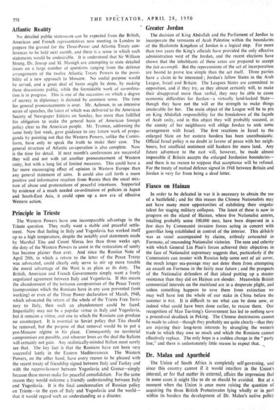Atlantic Reality
No detailed public statements can be expected from the British, American and French representatives now meeting in London to prepare the ground for the Three-Power and Atlantic Treaty con- ferences to be held next month, and there is a sense in which such statements would be undesirable. It is understood that Sir William Strang, Dr. Jessup and M. Massigli are attempting to state detailed issues on a large number of questions ranging from the defence arrangements of the twelve Atlantic Treaty Powers to the possi- bility of a new approach to Moscow. No useful purpose would be served, and a great deal of harm might be done, by making these discussions public, while the formidable work of co-ordina- tion is in progress. This is one of the occasions on which a degree of secrecy in diplomacy is dictated by common sense. The time for general pronouncements is over. Mr. Acheson, in an intensive series of speeches, the latest of which was delivered to the American Society of Newspaper Editors on Sunday, has more than fulfilled his obligation to make the general basis of American foreign policy clear to the American people. Mr. Truman, addressing the same body last week, gave guidance to any future work of propa- ganda by pointing out that the Western Powers, unlike the Comin- form, have only to speak the truth to make their case. The general structure of Atlantic co-operation is also complete. Now is the time for detail. If next month's conferences are successful they will end not with yet another pronouncement of Western unity, but with a long list of limited measures. This could have a far more encouraging effect of opinion in Western Europe than any general statement of aims. It could also call forth a more positive and informative reaction from Russia than the usual mix- ture of abuse and protestations of peaceful intentions. Supported by evidence of a much needed co-ordination of policies in Japan and South-East Asia, it could open up a new era of effective Western action.










































 Previous page
Previous page